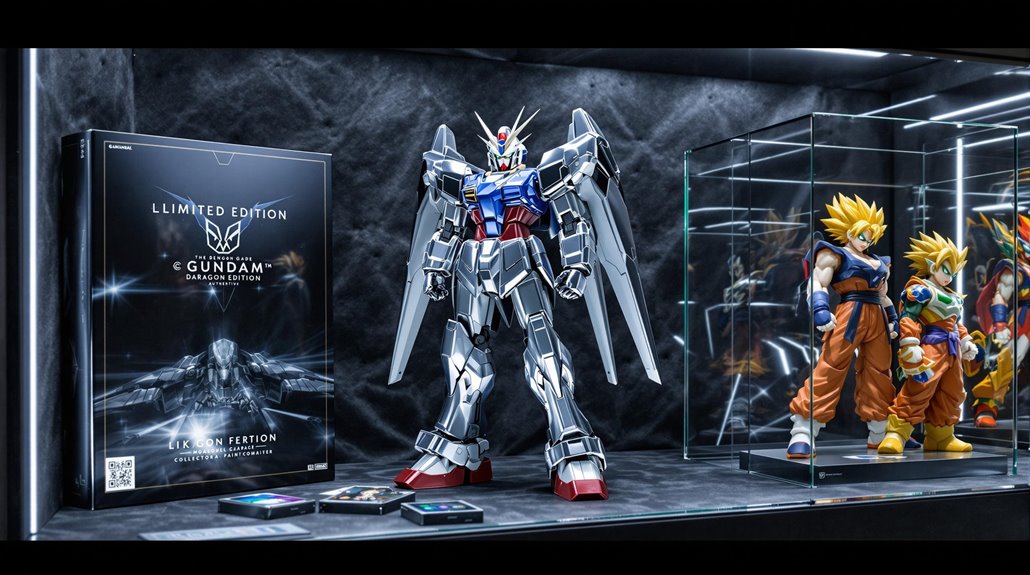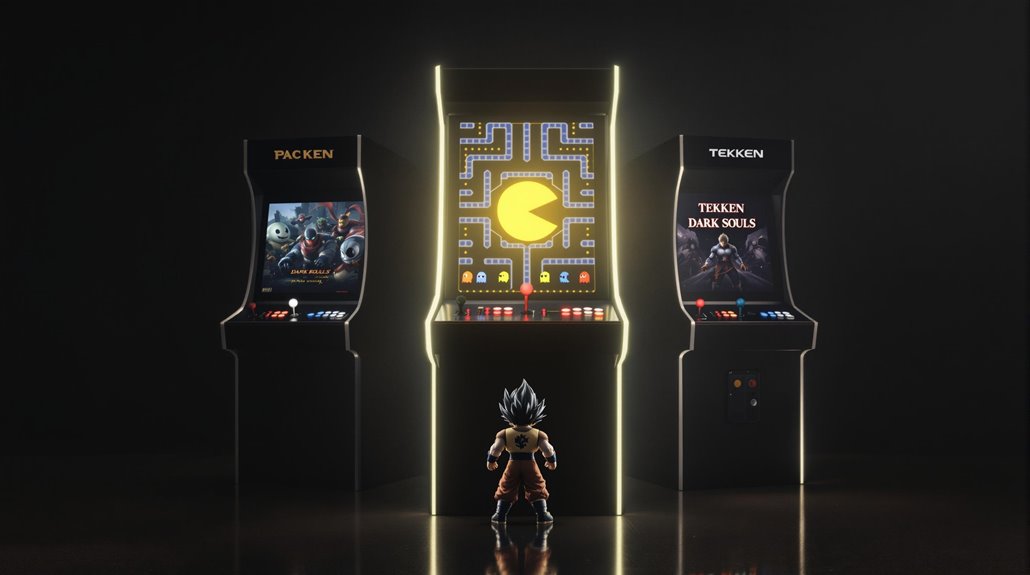What Is Bandai Namco's Biggest Game?
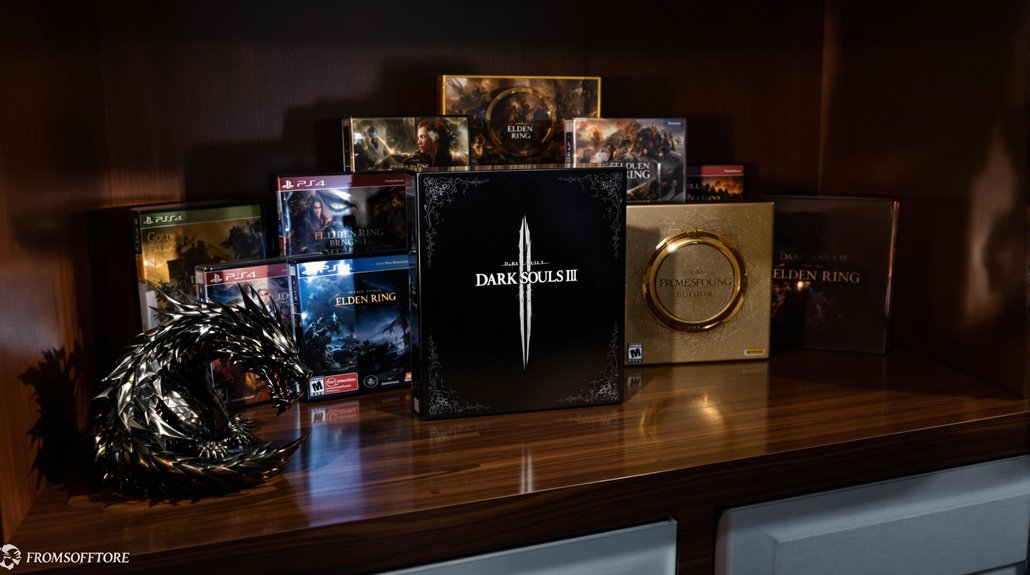
Pac-Man reigns as Bandai Namco's biggest game franchise, generating an impressive $12.8 billion in revenue since its 1980 arcade debut. While Dragon Ball games have achieved massive success with 380 million units sold worldwide, and Tekken has surpassed 50 million units, Pac-Man's cultural impact and financial success remain unmatched. From iconic franchises like Tales and Ridge Racer to modern hits like Elden Ring, Bandai Namco's gaming empire holds many more fascinating success stories.
The Legacy of Bandai Namco's Gaming Empire
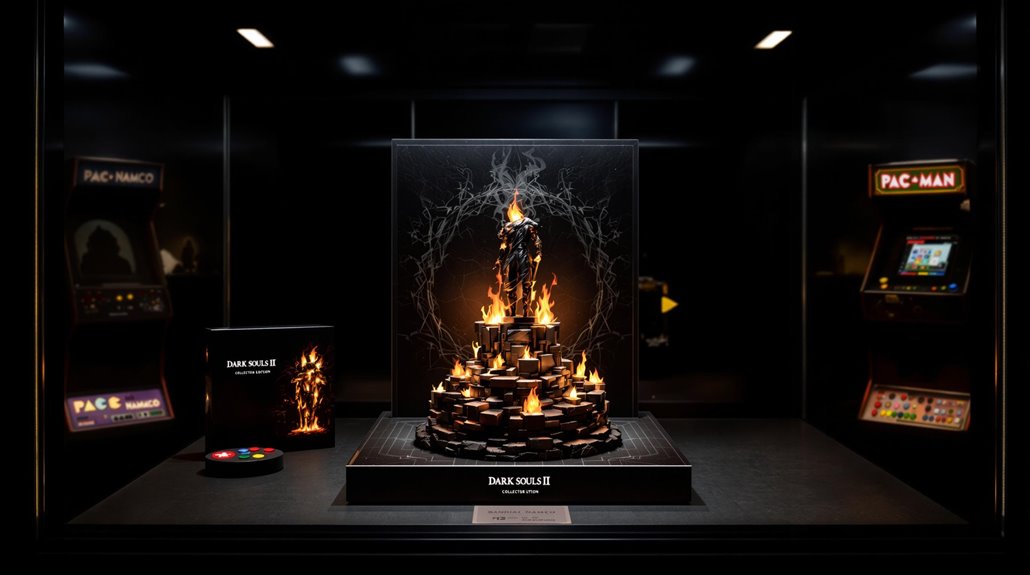
Three iconic franchises stand at the forefront of Bandai Namco's extraordinary gaming legacy. You'll find Pac-Man leading the charge as their highest-grossing video game franchise, generating an impressive $12.8 billion in revenue. The fighting phenomenon Tekken follows with over 50 million units sold, while Dragon Ball games have achieved a staggering 380 million units in global sales.
As Bandai Namco Holdings continues to evolve, you've seen them immerse themselves in diverse genres through series like Ace Combat, Dark Souls, and the recent hit Elden Ring. They've proven their versatility by presenting everything from Studio Ghibli-inspired RPGs like Ni No Kuni to aerial combat simulators. Their success isn't just about numbers - it's about consistently creating memorable experiences that push gaming boundaries and enrapture players across generations. The company's dedication to innovation extends beyond gaming, as evidenced by their pioneering High Grade Gunpla model kits that revolutionized the hobby market in the 1980s.
Sales Milestones Across Major Franchises
Behind Bandai Namco's gaming empire lies a series of extraordinary sales achievements across its major franchises. When you look at the numbers, you'll find impressive milestones that showcase the company's dominance in various gaming genres.
- Dragon Ball leads the pack with a staggering 380 million units sold worldwide, making it Bandai Namco Entertainment's most successful property
- Tekken follows as the company's best-selling franchise, with over 50 million units sold globally
- Ridge Racer has maintained its position as a racing game powerhouse, achieving more than 40 million unit sales
- Taiko no Tatsujin: Drum n Fun has plunged into impressive numbers with 10 million console game sales, while Little Nightmares has carved its own success with 1.2 million units sold
These figures demonstrate Bandai Namco's ability to create hits across diverse gaming categories.
The company's success in gaming parallels its pioneering work in model kits, with the first Gunpla release in 1980 establishing a new standard for hobbyist collectibles.
Tales Series Global Impact and Success
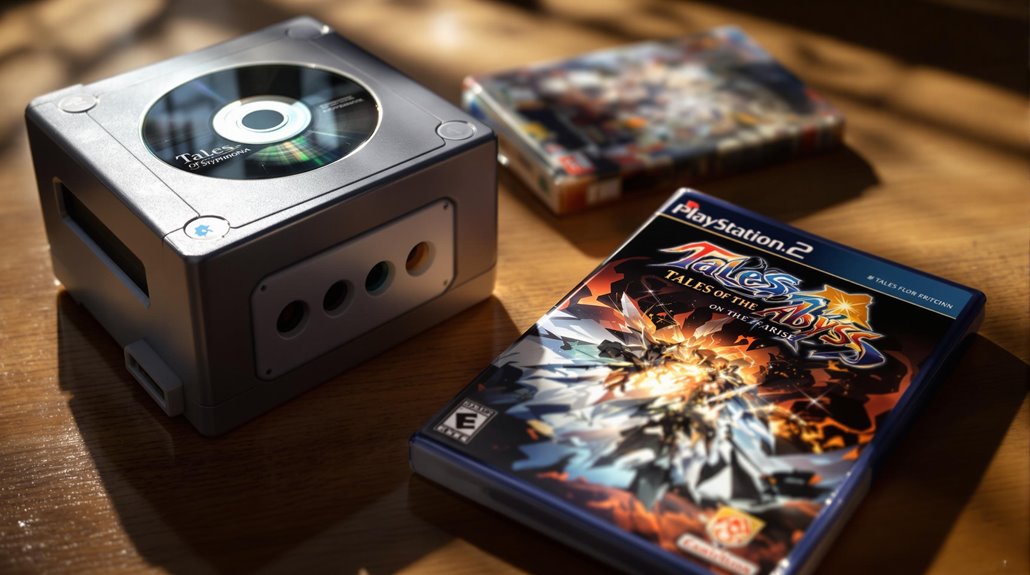
Among Bandai Namco's most cherished franchises, the Tales series stands as a monument to the enduring appeal of JRPGs worldwide. With over 25 million units sold globally, you'll find that this beloved series has consistently enthralled audiences through its lively combat systems and rich storytelling.
Tales of Symphonia marked a crucial moment in 2003, propelling the franchise into mainstream success with 2.4 million copies sold. The series' signature blend of anime-inspired visuals and engaging narratives has kept fans coming back for more.
You can see this continued success in Tales of Arise, which sold 1.5 million copies in 2021 and earned widespread critical acclaim. As one of Bandai Namco's most prized properties, the Tales series keeps expanding its reach through regular mainline releases and spin-offs. Much like the real robot anime genre pioneered by Mobile Suit Gundam in 1979, the Tales series revolutionized its own category of gaming with innovative combat mechanics.
Analyzing Tales of Symphonia's Market Performance
The extraordinary success of Tales of Symphonia revolutionized Bandai Namco's market presence in 2003, with its 2.4 million copies sold setting a new benchmark for the series. You'll find this JRPG's astounding performance reflected in its continuous re-releases across five different platforms, proving its enduring appeal in the video games market.
Key factors contributing to Tales of Symphonia's sales success include:
- Strong mainstream crossover appeal attracting both hardcore and casual JRPG fans
- Multiple successful console ports expanding the game's reach
- Critically acclaimed storytelling and gameplay mechanics
- Strategic positioning as Bandai Namco's flagship Tales franchise entry
The game's commercial triumph hasn't just impacted sales figures - it's established Tales of Symphonia as a cornerstone of Bandai Namco's portfolio, influencing the company's approach to future JRPG development and global market strategy.
Cross-Platform Release Strategy
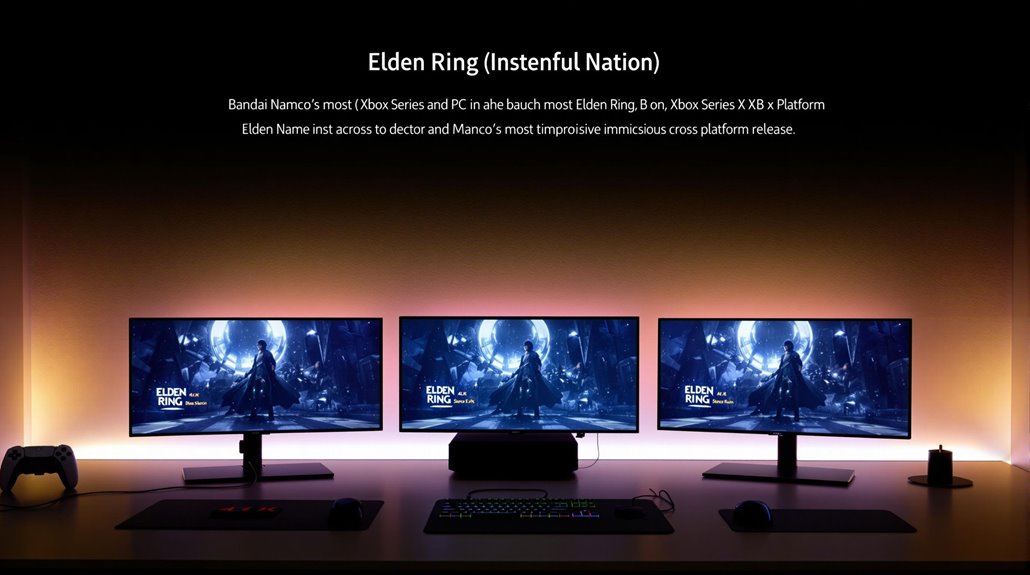
Strategic cross-platform releases have defined Bandai Namco's approach to game distribution since the early 2000s. You'll find their best video games available across multiple platforms, from consoles and PCs to mobile devices, ensuring you can enjoy titles like Tekken and Soulcalibur wherever you prefer to play.
This cross-platform strategy has proven essential to Bandai and Namco's success, helping their games reach millions of players worldwide. They've consistently brought their classic franchises, including Pac-Man and Dig Dug, to modern platforms, keeping these beloved titles relevant for new generations.
JRPG Market Dominance
Since establishing itself as a powerhouse in the gaming industry, Bandai Namco has dominated the JRPG market through iconic franchises like Tales and Ni No Kuni. You'll find their influence everywhere in the genre, with impressive sales volumes and critical acclaim backing their success.
Key factors in Bandai Namco's JRPG dominance include:
- Tales series success, with Tales of Symphonia selling over 2.4 million copies
- Partnership with Studio Ghibli for Ni No Kuni, creating an expert narrative about grief and loss
- Consistent quality across multiple game franchises
- Smart platform strategy with re-releases and ports extending their market reach
The company's ability to create engaging stories while maintaining deep gameplay mechanics has helped them capture both hardcore JRPG fans and newcomers alike, solidifying their position as a market leader.
Franchise Longevity and Player Retention
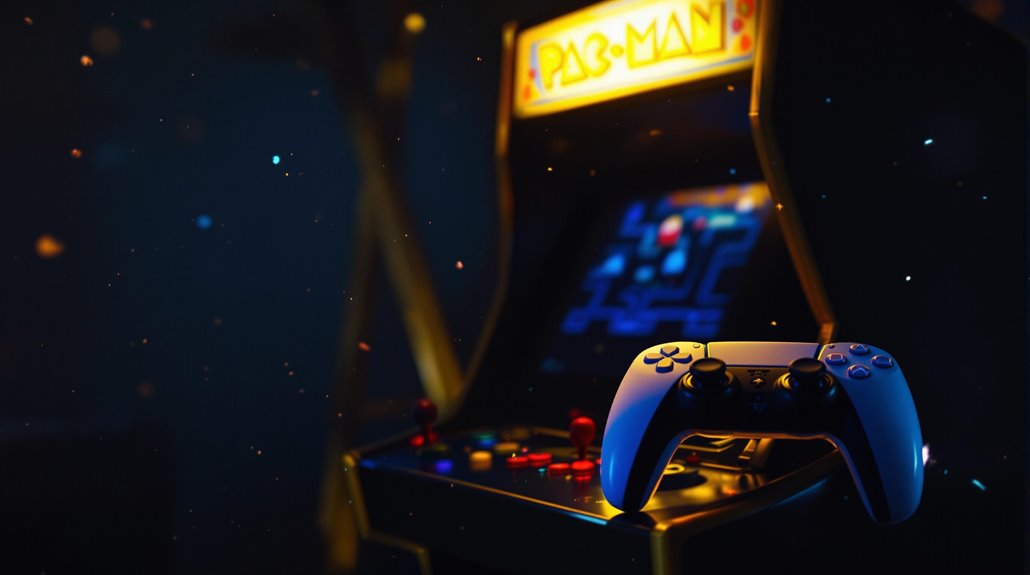
While many game companies struggle to maintain long-term player interest, Bandai Namco has perfected the art of franchise longevity through its diverse portfolio of cherished series. The game industry has witnessed the company's exceptional success with Tekken leading as their best-selling game franchise at over 50 million units, while Dragon Ball games have achieved an astounding 380 million in combined shipments and digital sales.
You'll find that player retention across Bandai Namco's franchises stems from their ability to innovate while maintaining core appeal. Whether it's the strategic depth of Ace Combat's fighter selection, Tales of Symphonia's engaging JRPG mechanics that moved 2.4 million copies, or Katamari Damacy's unique gameplay loop, each series has carved out its own dedicated following while continuously attracting new players.
Gaming Industry Influence and Innovation
Throughout gaming history, Bandai Namco has carved out an impressive legacy of innovation that extends far beyond its native Japan. The 2005 merger of Bandai and Namco created one of the world's major toy companies and gaming powerhouses, leading to pioneering developments across multiple genres.
When you look at the Best Bandai Namco Games, you'll find several revolutionary titles that have shaped the industry:
- Dark Souls redefined action RPGs with its challenging gameplay mechanics
- Tekken revolutionized 3D fighting games with its energetic combat system
- Suit Gundam brought mecha combat to mainstream gaming audiences
- Pac-Man became a cultural phenomenon, selling millions of units worldwide
The company's influence continues to grow through its commitment to developing new IPs while maintaining its classic franchises, ensuring its position as an industry innovator.

